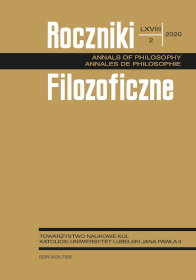The Cartesianism and Anti-Cartesianism of Locke’s Concept of Personal Identity
Abstract
This article focuses on the relationship between the conceptions of personal identity presented by Descartes and by Locke. Contrary to common readings, I claim that the difference between them cannot be reduced to a simple contrast between rational substantialism and genetic empiricism. Locke does not resign from the substantialist position but delimits the two spheres: natural cognition with its foundation in experience and philosophical speculations, in which he tries to present a rational interpretation of religious dogmas which is consistent with his epistemological programme. Locke’s criticism is directed against the Cartesian notion of a thinking thing as a substance independent of the body and his description of the differentiation of experience and his depiction of human subjectivity is expanded in relation to Cartesian philosophy: personal identity gains explication at four complementary levels: psychological, biological, socio-legal, and religious.
References
Alison, Henry. “Locke’s Theory of Personal Identity. A Re-examination.” In John Locke. Critical Assessments, edited by Richard Ashcraft, 4:527–44. London: Routledge, 1991.
Behan, David P. “Locke on Persons and Personal Identity.” In John Locke. Critical Assessments, edited by Richard Ashcraft, 4:564–85. London: Routledge, 1991.
Berkeley, George. The Works of George Berkeley, Bishop of Cloyne. Edited by Arthur A. Luce and Thomas E. Jessop. London: Nelson, 1948–1957.
Bolton, Martha Brandt. “Locke’s Account of Substance in Light of His General Theory of Identity.” In Locke and Leibniz on Substance, edited by Paul Lodge and Tom Stoneham, 63–88. London–New York: Routledge, 2015.
Butler, Joseph. The Analogy of Religion. Philadelphia: J. B. Lippincott, 1873.
Christofidou, Andrea. Self, Reason, and Freedom: A New Light on Descartes’ Metaphysics. London–New York: Routledge, 2016.
Dempsey, Liam P. “‘A Compound Wholly Mortal’: Locke and Newton on the Metaphysics of (Personal) Immortality.” British Journal for the History of Philosophy 19, no. 2 (2011): 241–64. Descartes, René. 1985–1986. The Philosophical Writings of Descartes. Edited and translated by John Cottingham, Robert Stoothoff, and Dugald Murdoch. Cambridge: Cambridge University Press.
Downing, Lisa. 2015. “Locke’s Choice between Materialism and Dualism.” In Locke and Leibniz on Substance, edited by Paul Lodge and Tom Stoneham, 128–45. London–New York: Routledge. Downing, Lisa. 2016. “Locke and Descartes”. In A Companion to Locke, edited by Matthew Stuart, 100–20. Malden–Oxford: Blackwell Publishing.
Forstrom, K. Joanna S. John Locke and Personal Identity. Immortality and Bodily Resurrection in Seventeenth-Century Philosophy. London–New York: Continuum, 2010.
Gaukroger, Stephen, John Schuster, and John Sutton, eds. Descartes’ Natural Philosophy. London–New York: Routledge, 2000.
Hamou, Philippe, and Martine Pecharman, eds. Locke and Cartesian Philosophy, Oxford: Oxford University Press, 2018.
Hamou, Philippe. “Locke and Descartes on Selves and Thinking Substances.” In Locke and Cartesian Philosophy, edited by Hamou Philippe and Martine Pecharman, 121–43. Oxford: Oxford University Press, 2018.
Haumesser, Matthieu. “Virtual Existence of Ideas and Real Existence: Locke’s Anti-Cartesian Ontology.” In Locke and Cartesian Philosophy, edited by Hamou Philippe and Martine Pecharman, 105–20. Oxford: Oxford University Press, 2018.
Hughes, M. W. “Personal Identity: A Defence of Locke.” In John Locke. Critical Assessments, edited by Richard Ashcraft, 4:545–63. London: Routledge, 1991.
Hume, David. A Treatise of Human Nature. London: Penguin, 1985.
James, William. The world of pure experience. In Essays in Radical Empiricism, edited by Ralph Perry, 39–44. New York: Longmans, Green, and Co., 1912.
Kim, Han-Kyul. “The Supposed but Unknown: A Functionalist Account of Locke’s Substratum.” In Locke and Leibniz on Substance, edited by Paul Lodge and Tom Stoneham, 28–44. London–New York: Routledge, 2015.
Kopania, Jerzy. 2014. “Descartes i problem nieśmiertelności duszy ludzkiej.” Roczniki Filozoficzne 62 (4): 9–32.
Lawler, James. Matter and Spirit: The Battle of Metaphysics in Modern Western Philosophy before Kant. Rochester, NY: University of Rochester Press, 2006.
Locke, John. An Essay concerning Human Understanding. Edited by Peter H. Nidditch. Oxford: Oxford University Press, 1975.
Locke, John. Resurrectio et quae sequuntur. In Writings on Religion, edited by Victor Nuovo, 232–37. Oxford: Clarendon Press, 2002.
McLaughlin, Peter. “Force, Determination, and Impact.” In Descartes’ Natural Philosophy, edited by Stephen Gaukroger, John Schuster, and John Sutton, 81–112. London–New York: Routledge, 2000. Newman, Lex. “Locke on Substance, Consciousness, and Personal Identity.” In Locke and Leibniz on Substance, edited by Paul Lodge and Tom Stoneham, 89–109. London–New York: Routledge, 2015.
Reid, Thomas. Essays on the Intellectual Powers of Man. Edinburgh: J. Bell, 1785. Robinson, Wade L. “Hume on Personal Identity.” The Philosophical Quarterly 11 (1962): 1.
Rorty, Amelié Oxenberg. “‘Pride Produces the Idea of Self’: Hume on Moral Agency.” Australasian Journal of Philosophy 68 (1990): 3.
Rozemond, Marleen. “Descartes and the Immortality of the Soul.” In Mind, Method, and Morality. Essays in Honour of Anthony Kenny, edited by John Cottingham and Peter Hacker. Oxford: Oxford University Press, 2010.
Shankula, H. A. S. “Locke, Descartes, and the Science of Nature.” In John Locke. Critical Assessments, edited by Richard Ashcraft, vol. 4. London–New York: Routledge, 1991.
Skirry, James. Descartes And the Metaphysics of Human Nature. London–New York: Continuum, 2006.
Stewart, Duncan, and Antonia LoLordo, eds. Debates in Modern Philosophy: Essential Readings and Contemporary Responses. London–New York: Routledge, 2012.
Woolhouse, Roger. Descartes, Spinoza, Leibniz: The Concept of Substance in Seventeenth-Century Metaphysics. London–New York: Routledge, 1993.
Yolton, John. Locke and French Materialism. Oxford: Clarendon Press, 1991.
Copyright (c) 2020 Roczniki Filozoficzne

This work is licensed under a Creative Commons Attribution-NonCommercial-NoDerivatives 4.0 International License.





